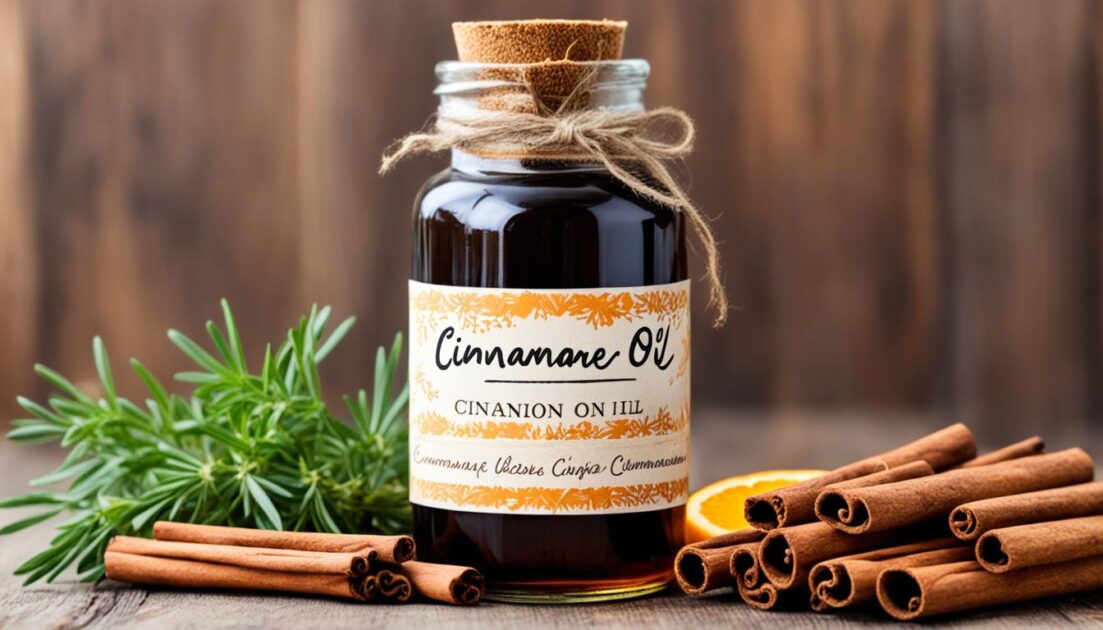Making cinnamon oil at home is a simple and cost-effective process that allows you to enjoy the numerous benefits of this essential oil. While technically not an essential oil, cinnamon oil or cinnamon extract is often searched for under the term “essential oil.” By using basic ingredients like cinnamon sticks and a carrier oil like olive oil, you can create your own homemade cinnamon oil that can be used in cooking and various other applications.
Key Takeaways:
- Creating homemade cinnamon oil is an affordable way to access its benefits.
- Basic ingredients like cinnamon sticks and carrier oil (e.g., olive oil) are needed.
- Cinnamon oil can be used in cooking and other applications.
- It offers potential health benefits, including antioxidant and anti-inflammatory properties.
- Proper storage is important to maintain freshness and effectiveness.
Health Benefits of Cinnamon and Coconut Oil
Both cinnamon and coconut oil offer a multitude of health benefits that can enhance your overall well-being. Let’s explore the healing properties of cinnamon oil and the numerous benefits of coconut oil.
The Healing Properties of Cinnamon Oil
Cinnamon oil contains powerful antioxidants and exhibits anti-inflammatory properties that can have a positive impact on your health. The antioxidants in cinnamon oil protect the body from cell damage caused by free radicals, which helps reduce the risk of chronic diseases. Moreover, its anti-inflammatory properties can help alleviate inflammation and fight off infections.
One remarkable benefit of cinnamon oil is its ability to help stabilize blood sugar levels. Research suggests that cinnamon oil can improve insulin sensitivity and enhance glucose metabolism, making it particularly beneficial for individuals with diabetes or those at risk of developing the condition. Additionally, cinnamon oil has been shown to lower levels of bad cholesterol, which can contribute to a healthier heart.
The Benefits of Coconut Oil
Coconut oil, often referred to as a “superfood,” possesses a unique set of health benefits. One notable advantage of coconut oil is its high content of healthy saturated fats. These fats can boost the levels of good cholesterol in your body, contributing to improved heart health.
Furthermore, coconut oil has been associated with potential weight loss benefits. The medium-chain triglycerides (MCTs) found in coconut oil can increase calorie burning and reduce appetite, making it a valuable addition to a balanced diet or weight management plan.
Coconut oil also showcases antimicrobial properties, thanks to its high lauric acid content. Lauric acid has been shown to have a potent effect against harmful bacteria, viruses, and fungi, aiding in prevention of infections.
Incorporating cinnamon oil and coconut oil into your lifestyle can have a positive impact on your health. Whether you’re looking to reduce inflammation, support blood sugar management, or explore natural remedies, these two oils can provide you with a range of benefits.

To showcase the health benefits of cinnamon and coconut oil, refer to the table below:
| Cinnamon Oil | Coconut Oil |
|---|---|
| Powerful antioxidants | Medium-chain triglycerides (MCTs) |
| Anti-inflammatory properties | Healthy saturated fats |
| Blood sugar stabilization | Improved heart health |
| Lowered bad cholesterol levels | Weight loss support |
| Fight against infections | Antimicrobial properties |
As demonstrated in the table, both cinnamon oil and coconut oil offer unique and complementary health benefits. Incorporating them into your daily routine can have a significant impact on your overall well-being.
Many Uses for Cinnamon Oil
Cinnamon oil is a versatile and aromatic essential oil with various applications in daily life. From enhancing the flavor of your favorite recipes to providing soothing benefits for your skin and hair, cinnamon oil offers a range of uses that make it a valuable addition to any home.
- In Cooking: Add a few drops of cinnamon oil to chili, stir-frys, teas, or baked goods like brownies and pancakes to infuse them with a delightful burst of warm and spicy flavor.
- For Skin: Incorporate cinnamon oil into your skincare routine by adding it to homemade bath products like lotions or shampoos. You can also apply it directly to your skin to soothe sore muscles and promote a sense of relaxation.
- For Hair: Boost the health of your hair by including cinnamon oil in your hair care regimen. Mix a few drops of cinnamon oil with your favorite carrier oil and massage it into your scalp to promote hair growth and improve overall scalp health.
Additionally, cinnamon oil can be used around the house for various purposes:
- As an Air Freshener: Dilute cinnamon oil with water and spray it in the air to create a warm and inviting atmosphere while neutralizing unpleasant odors.
- In Homemade Cleaners: Mix cinnamon oil with natural cleaning ingredients like vinegar and baking soda to create effective and aromatic homemade cleaners for your home.
- As a Natural Moth Repellent: Dab a few drops of cinnamon oil on cotton balls and place them in closets or drawers to repel moths and keep your clothes smelling fresh.
With its rich aroma and beneficial properties, cinnamon oil offers endless possibilities for use in your day-to-day life. Whether you are experimenting with new recipes, taking care of your skin and hair, or creating a cozy ambiance in your home, cinnamon oil is a versatile and convenient essential oil to have on hand.

References:
1. Healthline. “Cinnamon Oil: Benefits, Uses, and Side Effects.” Healthline, Healthline Media, 2 Nov. 2021, www.healthline.com/health/essential-oils/cinnamon-oil.
2. Natural Living Family. “21 Benefits of Cinnamon Essential Oil.” Dr.Axe, CMR, 1 Nov. 2021, www.draxe.com/nutrition/cinnamon-oil/.
How to Make Cinnamon Oil at Home
In order to make cinnamon oil at home, you will need cinnamon sticks and a carrier oil such as olive oil. Here is a simple recipe to guide you through the process:
- If you are using cinnamon sticks, place them in a pan and cover them with olive oil.
- Simmer the oil and cinnamon sticks for 2-3 hours on low to medium heat. This will allow the cinnamon to infuse into the oil.
- If you prefer to use ground cinnamon, mix it with the oil in a saucepan and simmer for 3-5 minutes.
- Let the oil cool for 10 minutes before transferring it to a glass jar. Be careful not to touch the hot oil.
- Place the jar in a warm spot and allow the oil to steep for 3 weeks. Gently turn the jar upside down daily to ensure proper infusion.
- After 3 weeks, strain the oil using cheesecloth to remove any cinnamon particles.
- Transfer the infused oil to a dark glass jar for storage. This will help protect the oil from light and extend its shelf life.
By following this recipe, you can easily create your own homemade cinnamon oil. It’s a wonderful way to enjoy the aroma and benefits of cinnamon in various applications.

Remember to always store your cinnamon oil in a cool, dry place to maintain its freshness and effectiveness. The resulting oil can be used in cooking, skincare, haircare, or even as a natural remedy.
Tips for Storing and Using Cinnamon Oil
Proper storage of cinnamon oil is crucial to maintain its freshness and effectiveness. To ensure the longevity of your cinnamon oil, store it in a cool, dry place away from direct sunlight. A dark glass jar is the best option as it helps protect the oil from light exposure.
If you choose to refrigerate the cinnamon oil, keep in mind that coconut oil, a common carrier oil for cinnamon oil, may solidify at colder temperatures. To use the refrigerated oil, simply warm it up before use by placing the jar in warm water for a few minutes.
When using cinnamon oil, remember that a little goes a long way. It is highly concentrated and should be used sparingly. Before applying it to a larger area, it is essential to perform a patch test on a small area of skin to check for any sensitivity or adverse reactions. This step helps ensure the oil is safe for personal use.
Enjoy the versatility of cinnamon oil by incorporating it into your daily life. Use it in your cooking to add a distinctive flavor to your recipes. Explore its potential as a natural remedy for various ailments or as a household aid, such as an air freshener or a natural moth repellent. Let cinnamon oil enhance your experiences with its delightful aroma and beneficial properties.
FAQ
Can I make cinnamon oil at home?
Yes, making cinnamon oil at home is a simple process that requires cinnamon sticks and a carrier oil like olive oil. By simmering the cinnamon sticks in the oil for a few hours and allowing it to steep, you can create your own homemade cinnamon oil.
What are the health benefits of cinnamon and coconut oil?
Cinnamon and coconut oil both offer a range of health benefits. Cinnamon has antioxidants and anti-inflammatory properties that can protect the body and improve blood sugar and cholesterol levels. Coconut oil is considered a “superfood” and can aid in fat loss, boost brain function, and have antimicrobial properties.
How can I use cinnamon oil?
Cinnamon oil has many uses. It can be used in cooking to add flavor to various dishes like chili and baked goods. It can also be used topically in homemade bath products or applied directly to the skin for muscle relief. Additionally, cinnamon oil can be used as an air freshener, in homemade cleaners, or as a natural moth repellent.
What is the process for making cinnamon oil at home?
To make cinnamon oil at home, you will need cinnamon sticks and a carrier oil like olive oil. Simmer the cinnamon sticks in the oil for a few hours or mix ground cinnamon with the oil and simmer for a few minutes. Let the oil steep for a few weeks, strain it, and transfer it to a dark glass jar for storage.
How should cinnamon oil be stored and used?
Cinnamon oil should be stored in a cool, dry place in a dark glass jar to maintain its freshness. If refrigerated, coconut oil may solidify and need to be warmed up before use. When using cinnamon oil, test it on a small area of skin first, and remember that a little goes a long way.






